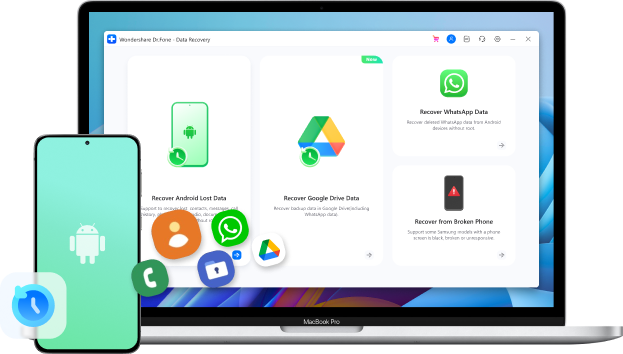
DiskDigger Photo Recover Review: Is It Worth Paying For?
Aug 27, 2025 • Filed to: Data Recovery Solutions • Proven solutions

DiskDigger Photo Recover is a data recovery tool that searches for your missing files. It claims to revive your photos, videos, and more. Even in the most desperate of times when you damage your device, you can try recovering with DiskDigger.
However, are all these claim correct? Can DiskDigger recover all files in every scenario? Is the full version worth the investment? We have answers to all these questions.
This guide will give you a complete review of DisDigger Photo Recover. We’ll cover its key features, Pros & Cons, how to use it, and some user reviews about DisDigger. We’ll also give you an excellent alternative to DiskDigger at the end of this article.
Part 1. How DiskDigger Works For Photo Recovery
Erased files do not disappear; they only wait in line for a new file to overwrite them. DiskDigger searches through the space where erased files live. After that, it pieces together the lost data for you.
The tool has two distinct recovery methods, each tailored to specific scenarios. The Basic Scan is a quick, efficient search for recently deleted files. It's like rummaging through your device’s “recycle bin.”
On the other hand, the Full Scan mode deep-searches your device’s storage. It uncovers files lost long ago, even after formatting. For maximum effectiveness, this mode requires root access on Android.

How to Use DiskDigger Photo Recovery
Step 1: Go to the Google PlayStore and search for the Disk Digger app. Make the DiskDigger download and install it.

Step 2: Launch DiskDigger on your mobile and click “Start Basic Photo Scan.” If you want a full scan, then root access is required.
Step 3: Select the minimum thumbnail size and set the file date. Now click OK.

Step 4: After completing the scan, browse the thumbnails of recoverable files displayed. Carefully select the photos you want to retrieve or choose all of them.
Step 5: Hit the "Recover" button and decide where to store your photos. Opt for a different folder on your device or utilize cloud storage services like Google Drive or Dropbox for added safety.
Double-check the saved files at their chosen destination to confirm they’ve been restored correctly.
Now, let's show you the different Key Features of the DiskDigger photo recovery app.
Part 2. Key Features of DiskDigger Photo Recovery
DiskDigger's multi-layered features make it accessible to the average user. Its Pro version provides enough depth for advanced recovery tasks.
Below, we break down its features in detail.
2-1. Free VS. Pro Versions
Free version: Good only for deleted photographs. Suitable only for minor file loss situations.
Pro version: DiskDigger Pro File Recovery provides complete recovery of various file types. It includes documents like DOCX and PDF, compressed files like ZIP, music, and more.
2-2. File format support
DiskDigger can handle various formats, such as JPG, PNG, MP4, MOV, DOCX, and PDFs.
2-3. Root Vs. No Root
With Root: Get profound access to the Android storage to perform a more detailed recovery.
Without Root: The application can still function; however, there is less functionality and few recovered files.
2-4. Recovery Choices
You can save files directly to the cloud (Google Drive, Dropbox), send them, or email them to a safe folder within you once.
2-5. Wipe Free Space
After deleting some files, you can use DiskDigger to wipe your free space. It removes all the traces of deleted files and makes it impossible to recover them afterward.
Now, let's see some pros and cons of using this tool.
Part 3. Pros and Cons of Disk Digger Photo Recovery APK
Every software has its advantages and weaknesses, and DiskDigger is no exception. Below, we explain why it shines and falls.
|
Pros |
Cons |
| Simple, intuitive interface. | Limited scope without rooting. |
| The free version offers essential recovery. | Recovery success isn’t foolproof. |
| Effective for recent photo deletions. | There is no DiskDigger WhatsApp recovery option. |
| It can wipe free space for you. | You can only recover photos in basic scans. |
Part 4. DiskDigger Pricing
DiskDigger's basic version is free for everyone. The cost of DiskDigger Pro depends on your platform and region. Usually, it's a one-time purchase that grants lifetime access to the premium features.
Now, let's move on and see some honest reviews about DiskDiggerapk and its rating on Google PlayStore.
Part 5. User Reviews and Ratings For DiskDiggerPro
On Google PlayStore, the DiskDigger app has an overall rating of 3.6/5 stars. On the other hand, the DiskDigger Pro file recovery has a rating of 3.1/5 stars on Google PlayStore.
Now, let’s briefly examine some positive and negative DiskDigger reviews.
5-1. The Positive Reviews
"An Absolute Lifesaver!"
A Google User recovered over 500 photos using DiskDigger. He was willing to give this tool 10 out of 5 stars in his review.
5-2. The Negative Reviews
“Lack of Functionality”
Many users complain that the app only shows photos already on the device.
“Recovering Only Thumbnails”
A Google Playstore user emphasized that you can only recover a tiny thumbnail of the images.
“A Huge List”
Many users also complain that DiskDigger shows a huge list of photos after scanning the device. This list contains deleted and existing images, and finding the required picture can be tiring.
Considering the low rating and many negative reviews, here is the DiskDigger alternative for recovering deleted data.
Part 6. The Best DiskDigger Alternative For You
While DiskDigger is a solid photo recovery tool, it’s far from your only option. Dr.Fone - Data Recovery (Android) emerges as a top contender if you're after a more comprehensive and powerful recovery tool. It’s designed for a wide array of data recovery scenarios.
With Dr. Fone, you get advanced algorithms, better data access, and an intuitive user interface. You can recover contacts, audio, messages, and even deleted WhatsApp data.

Dr.Fone - Data Recovery (Android)
Recover whatsapp/contacts/messages/call history saved in Google Drive to your computer.
- Recover Android data by scanning your Android phone & tablet directly.
- Preview and selectively recover what you want from your Android phone & tablet.
- Supports various file types, including WhatsApp, Messages & Contacts & Photos & Videos & Audio & Document.
- Supports 6000+ Android Device Models & Various Android OS.
6-1. Why Choose Dr.Fone Over DiskDigger?
- Broad Data Recovery Scope
The software retrieves images, contacts, messages, videos, audio, and documents.
- For All Possible Cases
From mistakenly deleting to having a virus invade your system, Dr.Fone can handle all that stuff.
- Higher Rates of Successful Recoveries
This software is claimed to recover higher rates even when recovering complex or high-level data losses.
- Preview your Recoverable Files
You can preview your files to pick the exact ones you need.
- Wide Supported Devices: Dr.Fone supports over 6,000 Android devices so that you can use them regardless of your brand.
- Selective Recovery
Just recover what you need and preserve storage space and effort.
6-2. Steps to Use Dr.Fone - Data Recovery
Step 1: Download Dr.Fone on your computer. Launch the tool and select Data Recovery from Toolbox.

Step 2: Select Android and Recover Android Data from the available option.
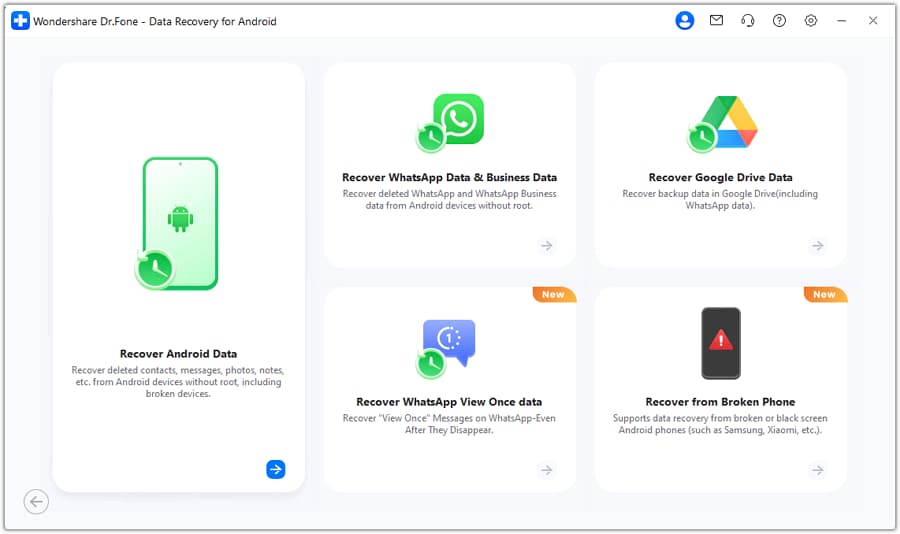
Step 3: Connect your mobile device to the computer and select the type of files you want to recover. Then, click on Start Scan.
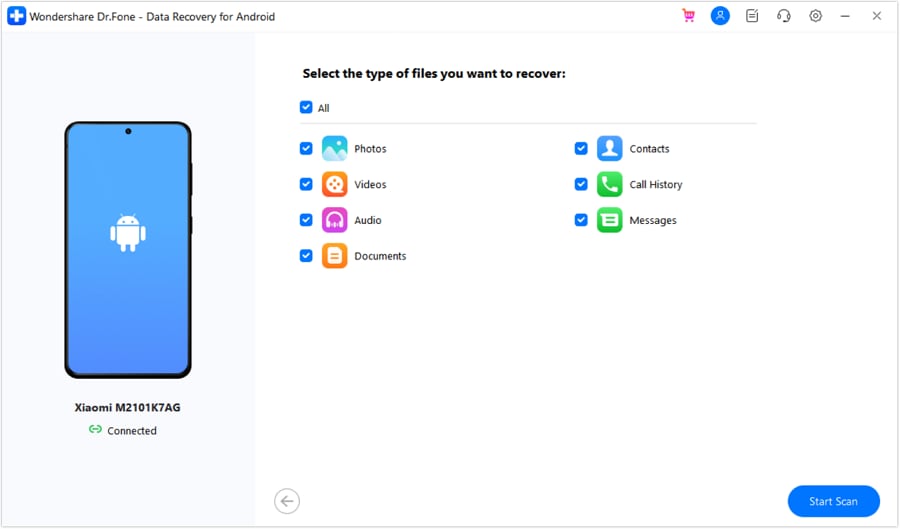
Step 4: Wait until the scanning is complete and Dr.Fone shows the available data.
Step 5: Select your preferred type from the filter option for your ease.
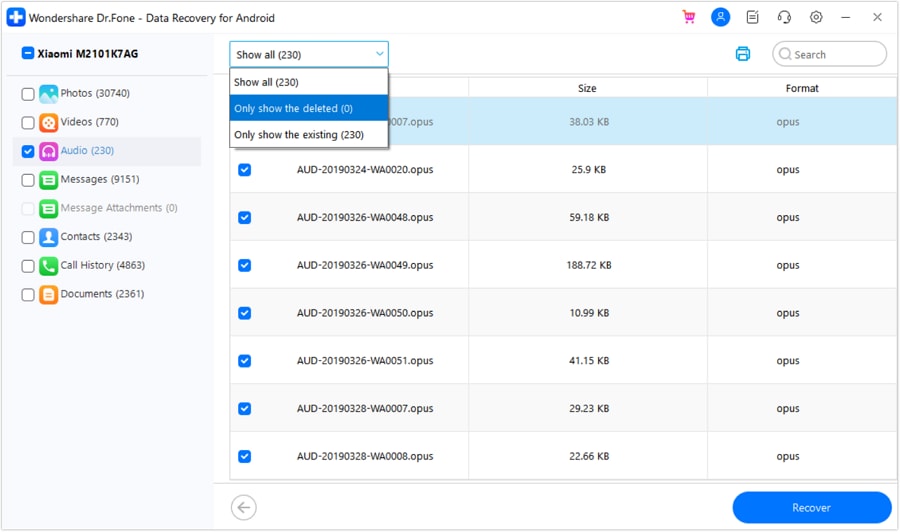
Step 6: Choose what you want, and click "Recover" to save them onto your computer.
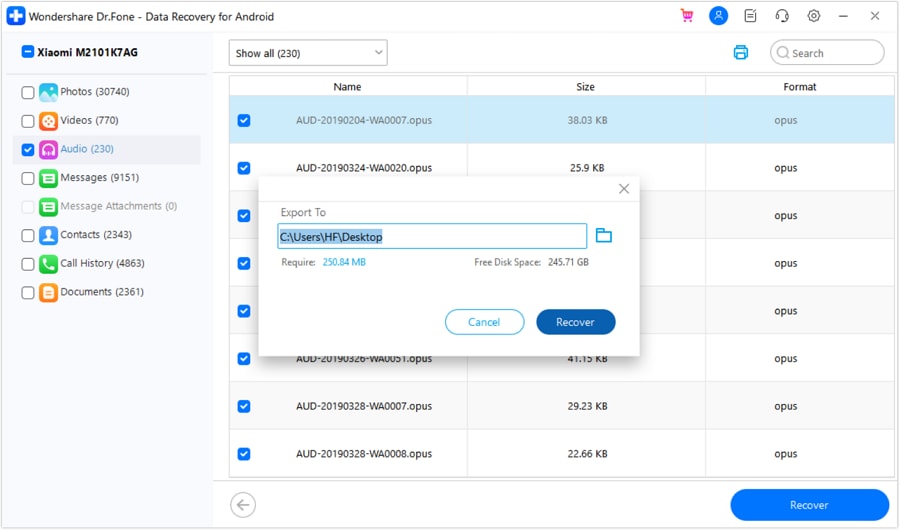
Pro Tip: Data recovery is time-sensitive. The sooner you act, the higher your chances of success. Avoid overwriting your storage with new files.
Conclusion
DiskDigger Photo Recover can recover photos from accidental deletions and everyday mishaps. It’s easy to use, and a free basic recovery version is available. But is it always enough? You might need a more advanced tool if your data crisis is severe.
When DiskDigger reaches its limits, Wondershare Dr.Fone steps in. This heavy-duty recovery tool recovers videos, messages, contacts, and much more than just photos. It outperforms where more straightforward tools fail. So, start with DiskDigger's free version to see if it works. Check out Dr.Fone - Data Recovery (Android) for a full recovery and see what it can do.
FAQs
Root access unlocks Full Scan mode, which provides complete access to your device's storage and significantly increases the chances of successful recovery.
Android Recover
- Recover Apps
- 1. Data Recovery Software for Android
- 2. Top 4 Android Data Recovery Tools
- 3. Restore Deleted Files on Android
- 4. Coolmuster Android Data Recovery
- 5. Guide of Disk Drill for Android
- 6. Android Data Recovery Software
- 7. Gihosoft Android Data Recovery
- 8. Jihosoft Android Phone Recovery
- 9. Minitool Android Mobile Recovery
- 10. Recover Android Data from Fucosoft
- 11. Best Mobile Forensics Tools to Recover Data
- 12. PhotoRec Review
- 13. FoneDog Toolkit
- 14. TWRP Recovery
- Contacts Recover
- 1. Recover Contacts from Stolen phone
- 2. Recover Contacts from Android
- 3. Retrieve Contacts Without Backup
- Files Recover
- 1. Recover Files from Internal Memory
- 2. Recover Miscellaneous Files
- 3. Recover Android's Hidden Files
- 4. Recover Deleted Files from Android
- 4. Recover Deleted Files Without Root
- 5. Recover Files from SD Card
- 6. Undelete Files on Android
- Messages Recover
- Music/Videos Recover
- Photos Recover
- 1. DiskDigger Photo Recover Review
- 2. Recover Deleted Photos from Android
- 3. Recover Photo from Internal Storage
- 4. Recover Photos from Lost Phone
- 5. Restore Android Deleted Photos
- Broken Android Recover
- 1. View Files from Broken Phone Screen
- 2. Recover Data from Dead Phone
- 3. Recover Contacts with Broken Screen
- 4. Recover Text Messages from Android
- 5. Recover Data from Internal Memory
- Social Apps Recover
- 1. Recover Facebook Messages
- 2. Recover WhatsApp Messages
- 3. Recover WhatsApp Messages
- 4. Restore Deleted WhatsApp Messages
- Android Recover Tips
- 1. SD Card Recovery Tools
- 2. Fix Recovery Mode Not Working
- 3. Enter Recovery Mode on Android
- 4. Recover Calendar from Android
- 5. Recover Deleted Call Log on Android
- 6. Clear Cache Partition
- 7. Repair a USB Stick
- 8. USB Repair Tools
- Cloud Storage Tips
- ● Manage/transfer/recover data
- ● Unlock screen/activate/FRP lock
- ● Fix most iOS and Android issues
- Recover Now Recover Now Recover Now

















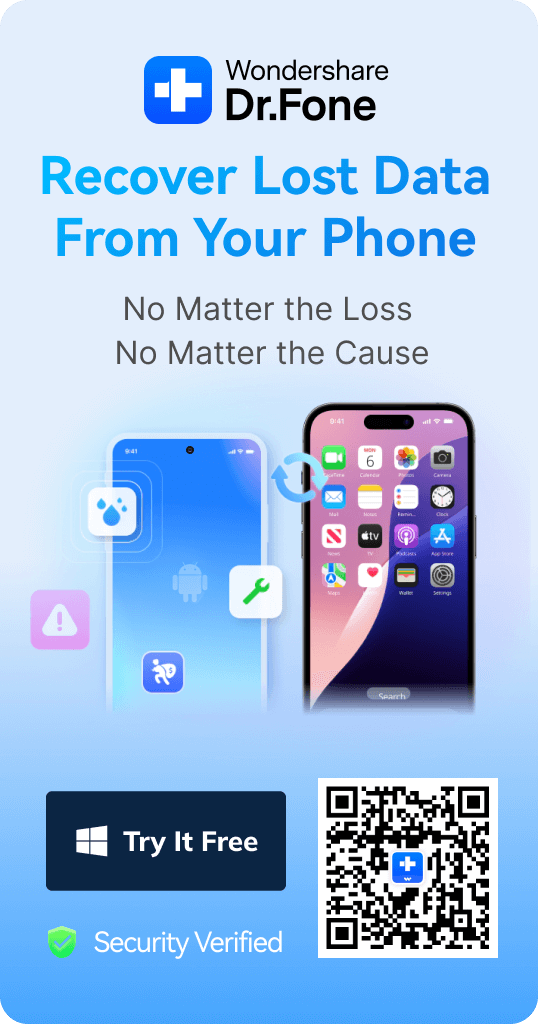

Daisy Raines
staff Editor